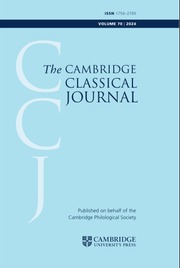Article contents
‘Why should I mention Io?’ Aspects of choral narration in Greek tragedy1
Published online by Cambridge University Press: 28 February 2013
Extract
The study of narrative, narratology, has for some decades now been a well-established subdiscipline within the large field of critical methodology. Even classical scholars generally resistant to theory have found it acceptable. In part this can be explained by its classical ancestry: it was Plato who emphasised the importance of distinguishing narrator-voice and character-voice, and Aristotle who identified some of the key elements constituting plot structured as story. Part of the success of narratology is also due to the distinction of its classical practitioners. Naturally, the main emphasis among the studies of classical texts has been upon the major narrative forms, epic and the novel; but broader examination of the whole generic range has extended the scope of this method, and the first volume of an encyclopaedic study of narrator and narration in classical literature has recently appeared.
- Type
- Research Article
- Information
- Copyright
- Copyright © The Author(s). Published online by Cambridge University Press 2007
References
BIBLIOGRAPHY
- 1
- Cited by


